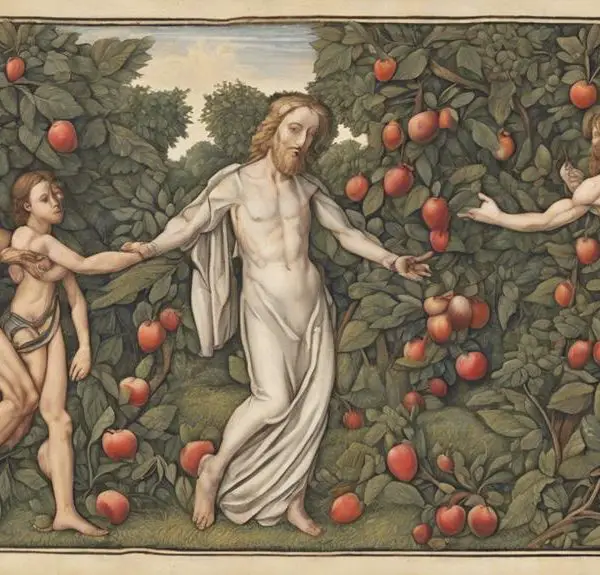Study the Bible's less-discussed tales of poor parenting, discovering unexpected lessons from Adam, Eve, King David, and more.

Examples of Bad Parenting in the Bible
You've likely read the Bible for its wisdom and moral guidance, but have you ever considered its examples of failed parenting? From Adam and Eve's inability to prevent the original sin to King David's blatant favoritism, the Bible is teeming with stories that showcase the dire consequences of poor parenting decisions.
Why not explore these stories with me, not to condemn, but to learn and possibly prevent repeating these mistakes in our parenting journey? Who knows, you might uncover some surprising insights into biblical characters you thought you knew well.
Key Takeaways
- Biblical figures like Adam, Eve, and King David exhibited parental failures such as disobedience, favoritism, and neglect, leading to negative family outcomes.
- Parental neglect and lack of discipline, as seen in Eli and King David, can result in rebellion, resentment, and divine judgement.
- Complex ethical dilemmas in parenting, evident in Abraham's and Lot's choices, highlight the challenges of biblical ethics.
- Effective communication, balanced discipline, and avoidance of favoritism are crucial for healthy parent-child relationships, as demonstrated by various biblical examples.
Adam and Eve's Parenting Failure

Diving into the biblical narrative of Adam and Eve, we find the first recorded instance of parenting failure, marked by their inability to effectively guide their offspring, Cain and Abel. Their parenting style, or lack thereof, can be traced back to Eve's persuasion and the Original Sin.
You'll notice that Eve's persuasion led Adam to partake in the forbidden fruit, a decision that marked humanity with Original Sin. This sin, you might argue, cast a shadow over their parenting abilities, creating an environment of disobedience and distrust. Their children, Cain and Abel, were born into this legacy of sin, and their upbringing was tainted by this heritage.
Interestingly, the Original Sin also impacted their ability to handle conflict. When Cain's jealousy boiled over into murderous rage against Abel, Adam and Eve's response was woefully inadequate. They failed to mediate the dispute or provide Cain with the moral guidance needed to prevent such an atrocity.
In essence, Adam and Eve's parenting failure is a stark reminder of the consequences of sin. Their inability to guide, instruct, and nurture their children in a godly manner serves as a cautionary tale, underscoring the importance of spiritual guidance in parenting.
Abraham's Sacrificial Decision

Shifting our focus, let's now consider another profound example of questionable parenting in the Bible: Abraham's decision to sacrifice his son, Isaac. This monumental episode, integral to the narrative of the Abrahamic Faith, has been a source of theological debate for centuries.
Abraham, revered as a paragon of faith, was confronted with the Divine Test of offering his beloved son as a sacrifice. You might question, how could a loving father agree to such a task? Indeed, it's a stark contrast to modern parenting norms where parents' primary duty is to protect and nurture their children.
Abraham's unwavering obedience to God's command, however, highlights the radical nature of his faith. His readiness to sacrifice Isaac encapsulates the essence of the Abrahamic Faith: absolute surrender to God's will. Yet, is such a surrender healthy or even morally acceptable when it involves the potential harm of one's child?
It's crucial to understand that in this narrative, God intervened, sparing Isaac's life. The episode underscores God's promise and provision, not child sacrifice. Yet, the psychological impact on Isaac remains a disturbing consideration, raising questions about the emotional trauma induced by Abraham's sacrificial decision. This example forces us to reckon with complexities of faith and parenting.
Lot's Disturbing Choices

Continuing our exploration, we often overlook another biblical character, Lot, whose parenting choices raise further questions about morality and responsibility within the sacred texts. Lot's morality is particularly called into question in Genesis 19, where he offers his virgin daughters to an angry mob to protect his house guests. This act, arguably a violation of parental duty, challenges our understanding of ethics within the biblical context.
Further into the narrative, we encounter the incestuous implications of Lot's choices. After the destruction of Sodom and Gomorrah, Lot's daughters, fearing they were the last humans on earth, made him drink wine and slept with him to preserve their family line. While this decision was ostensibly their own, it's worth considering the role that Lot's earlier actions and decisions may have played in shaping their moral compass.
In both instances, Lot's actions provide a stark reminder of the complex and sometimes troubling nature of biblical morality. They challenge us to approach these sacred texts with a critical eye, acknowledging the nuanced and problematic aspects of biblical narratives, even as we seek to glean wisdom from them. These episodes of Lot's parenting underscore the importance of critically engaging with the biblical text.
King David's Favoritism

You'll find another striking example of questionable parenting in the biblical narrative of King David, whose blatant favoritism among his children resulted in tragic familial strife. David's bias, particularly towards his son Absalom, set in motion a series of events that led to rebellion, murder, and heartbreaking loss.
The theological implications of David's favoritism are vast. It serves as a cautionary tale, underscoring how partiality can't only destabilize families but also disrupt the divine order. The favoritism consequences played out dramatically in David's household, with Absalom's rebellion against his father and the eventual loss of his life.
In theological terms, David's partiality reflected a deviation from the equitable love God shows His children. David's flawed parenting offers a stark contrast to the love of the Heavenly Father, who 'does not show favoritism but accepts from every nation the one who fears him and does what's right' (Acts 10:34-35).
Eli's Neglectful Priesthood

Similarly to David's favoritism, Eli's neglect of his priestly duties presents another example of poor parenting, albeit in a spiritual context. Eli, a high priest, allowed his sons to misuse their positions of authority, failing to correct them in their priestly irresponsibility. This is a stark portrayal of weak spiritual guidance and lack of discipline.
Eli's consequences were severe. God's judgement fell upon him and his lineage because of his unwillingness to rein in his sons' unholy behavior. The narrative in 1 Samuel 2:12-36 presents Eli as a passive observer, failing to intervene despite being fully aware of his sons' sinful actions.
This biblical account serves as a warning about the spiritual implications of parental neglect. Eli's inability to enforce godly standards led to the downfall of his family and the loss of his priestly line. His story underscores the critical importance of parents taking active roles in guiding their children's spiritual growth. Eli's saga is a potent reminder that neglecting parental responsibilities, especially in a spiritual context, can have dire consequences. It's a sobering lesson that calls for introspection and proactive engagement in the spiritual upbringing of children.
Lessons From Job's Tragedy

Turning our attention to the tragic narrative of Job, we can glean invaluable lessons on the trials of parenting under extreme circumstances. Job's patience, a virtue that stands prominently in the face of his immense loss and suffering, is a lesson in resilience for parents enduring trials.
Examining Job's tragedy through the lens of suffering interpretations, we see his response to his misfortune wasn't one of blame or resentment towards his children, who were at the core of his anguish. However, he maintained a steadfast faith, despite the gut-wrenching loss. This is a crucial lesson for you, as a parent in the throes of hardship.
Job's patience highlights the importance of approaching suffering with grace, humility, and unshakeable faith. His story teaches us that hardships, while challenging, can be transformative, molding us into stronger, more resilient beings.
In essence, Job's saga, a paragon of suffering interpretations, teaches parents that patience and steadfast faith can guide them through the darkest hours. Remember, your trials, much like Job's, are temporary. Your resilience and faith will see you through, shaping you into a stronger, more compassionate parent.
Frequently Asked Questions
How Does the Story of Cain and Abel Reflect on Adam and Eve's Parenting Style?"
The story of Cain and Abel reveals Adam and Eve's parenting through sibling rivalry consequences. You see Cain's jealousy of Abel, which isn't addressed by their parents, leading to Abel's death.
Divine intervention plays a role, suggesting a lack of parental guidance. Therefore, Adam and Eve's passive approach possibly contributes to this tragic outcome.
It's an analysis of how parents' neglect can escalate sibling rivalry into destructive consequences.
Can Abraham's Willingness to Sacrifice Isaac Be Justified in Any Way as a Parenting Decision?"
You might argue that Abraham's willingness to sacrifice Isaac was an act of extreme faith, not poor parenting. He demonstrates a level of obedience to God that's unparalleled. He's not neglectful or abusive, but wholly committed to his beliefs.
However, this decision is complex and raises many moral and ethical questions. From a modern perspective, it's hard to justify, but in the context of Abraham's faith, it was seen as the ultimate act of obedience.
What Were the Consequences of King David's Favoritism for His Other Children?"
You'll find King David's favoritism led to serious consequences in his family. This favoritism fallout resulted in sibling rivalry, resentment, and even murder.
Absalom's rebellion against David's throne can be traced back to this favoritism. David's consequences were significant – his family was torn apart and his kingdom nearly lost.
This story serves as a stark reminder of the potential devastation caused by parental favoritism.
How Did Eli's Neglectful Priesthood Impact His Role as a Father?"
Eli's legacy as a father was impacted by his neglectful priesthood. He failed to reprimand his sons for their sins, which reflected poorly on his role as a father. His priesthood influence should've guided them towards righteousness, but instead, it allowed them to stray.
You can see how Eli's lax approach to discipline led to their downfall. This showcases a clear link between parental neglect and a child's moral development.
What Can Modern Parents Learn From Job's Tragedy?"
You can learn from Job's resilience and his acceptance of suffering. His experiences teach you that life may bring immense hardship, yet one must remain steadfast. Job's faith never wavered, even when he lost everything.
This shows the importance of resilience in parenthood. Just like Job, you should accept that suffering is part of life but never let it shake your resolve or your dedication to your children.
Conclusion
In conclusion, the Bible isn't shy about highlighting instances of poor parenting. Adam and Eve's disobedience, Abraham's drastic decision, Lot's unsettling choices, David's favoritism, and Eli's neglect all serve as cautionary tales.
These narratives don't exist to condemn, but rather to provide insight and guidance. As we reflect on Job's tragic experiences, let's remember to seek wisdom in our parenting, always striving for love, respect, and understanding.



Sign up